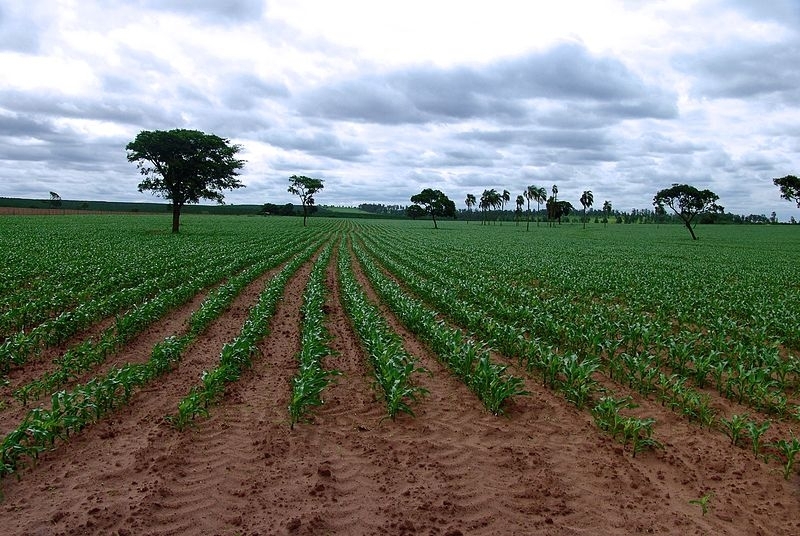


The so-called safrinha could suffer from extreme drought events in the Center-West, Southeast and South caused by global warming, according to a study supported by FAPESP and Belmont Forum (photo: Wikimedia Commons)
Published on 03/19/2021
By Elton Alisson | Agência FAPESP – Climate change is a major threat to the ability of Brazilian agribusiness to maintain its current levels of productivity and leadership in agricultural commodity exports. Extreme events caused by global warming, such as drought in front-ranking farming regions, for example, may affect the second corn crop (“safrinha”), which takes place between January and April (after the summer corn and soybean harvest) in the Center-West, Southeast and South.
These are some of the conclusions of a study led by researchers in the University of Campinas’s Center for Environmental Studies (NEPAM-UNICAMP) in Brazil who are participating in a project supported by FAPESP under the aegis of a cooperation agreement with the Belmont Forum.
Selected findings of the study were presented in a webinar on the “Impacts of climate change on Brazilian society – science focusing on solutions produced by FAPESP-Belmont Forum cooperation”.
The online seminar was held on June 16, hosted by FAPESP and the Belmont Forum, an international consortium comprising many of the world’s leading funders of research on environmental change.
“Of all the scenarios we ran to estimate the potential impacts of different biophysical and human processes on agricultural production in Brazil, those relating to climate change had the most significant effects,” said Mateus Batistella, a researcher affiliated with NEPAM-UNICAMP and the Agricultural Informatics unit of the Brazilian Agricultural Research Corporation (EMBRAPA).
With colleagues in the United States, United Kingdom and China, the NEPAM-UNICAMP group set up a research collaboration called the Telecoupling Challenge to study how socioeconomic and environmental interactions between coupled natural and human systems (such as the agricultural commodity production and trade systems) can affect food security and land use.
The researchers developed models representing trade in agricultural commodities, especially soybeans and corn, between producers such as Brazil and the US and importers such as China. They also developed scenarios to estimate its local and global socioeconomic and environmental effects. In Brazil, these scenarios focused on Mato Grosso and nine other states that produce more than 80% of the soybeans and corn grown in Brazil. Projected changes in rainfall and temperature in the region based on the RCP 4.5 and RCP 8.5 scenarios produced by the Intergovernmental Panel on Climate Change (IPCC) pointed to impacts on the second corn crop.
“Extreme drought events are a major threat to the maintenance of a successful cycle in Brazilian agriculture,” Batistella said. “To reduce this vulnerability, research institutions like EMBRAPA are working hard on the development of more drought-resistant varieties of corn, for example.”
External dependency
In addition to environmental processes, the researchers also simulated the effects of world trade on flows of agricultural commodities. One of the situations analyzed was a fall in the supply of fertilizers, especially potassium, to Brazil.
Brazil imports 85% of its required potassium from only four countries: Canada, Russia, Belarus and Germany. A decrease in potassium exports by these countries could significantly affect the Brazilian production of agricultural commodities, according to the researchers.
“Brazil must find alternative sources of potassium in order to reduce its external dependency on this input,” Batistella said.
Brazil’s soybean exports are also highly concentrated, he added, with 75% going to China, which has converted areas previously dedicated to soybean growing in its northeastern province of Heilongjiang to corn and irrigated rice. This decision has resulted in a rise in Chinese demand for nitrogen fertilizer and, consequently, in an intensification of the environmental impact of agrochemicals in China.
“This illustrates the effects of telecoupling over long distances, as in the case of agricultural commodity production and flows,” Batistella said.
Focus on solutions
Other climate change research initiatives aimed at the development of science-based solutions for society in the context of the FAPESP-Belmont Forum cooperation agreement were discussed during the webinar.
Under the agreement, FAPESP has issued 13 calls for proposals in partnership with funding agencies in other countries and supported 31 projects, some led by researchers at universities and research institutions in the state of São Paulo, said Reynaldo Victória, a retired researcher affiliated with the University of São Paulo’s Center for Nuclear Energy in Agriculture (CENA-USP).
“For every euro invested by FAPESP in Belmont Forum projects, other agencies have invested 35 euros. At the end of 2019, the total exceeded 90 million euros,” noted Victória, a member of the steering committee for FAPESP’s Research Program on Global Climate Change (RPGCC) and one of its representatives to the Belmont Forum.
The projects funded by the consortium are transdisciplinary and transnational, with scientists from a wide range of knowledge areas collaborating with civil society and policymakers to develop and implement solutions jointly, according to Erica Key, Executive Director of the Belmont Forum.
“Over the last ten years, we’ve had 18 global calls, and FAPESP has partnered with us on most of them, always supporting projects of high merit and relevance. We hope to continue collaborating with FAPESP to build out this transdisciplinary community that is transforming policy and practice in strategic areas such as food security, fresh water security, biodiversity, coastal vulnerability, climate, environment and health,” Key said.
The participants in the webinar stressed that in addition to the COVID-19 pandemic, the world faces the crises of climate change and biodiversity loss and that these three crises require cross-cutting solutions linked to public policy.
“Attention currently focuses on COVID-19 and its impacts, as is right and proper. When we look back, however, it will be seen as only a moment in history. On the other hand, the climate crisis and its effects will not only persist but, unfortunately, become increasingly intense and last far longer,” said Luiz Eugênio Mello, FAPESP’s Scientific Director.
Source: https://agencia.fapesp.br/33622